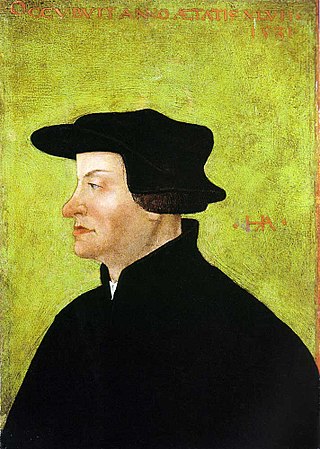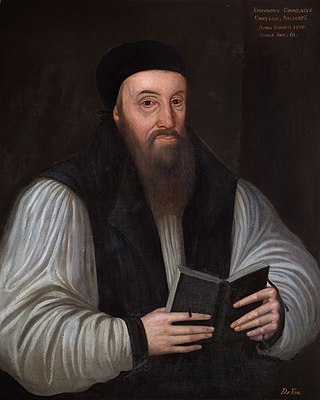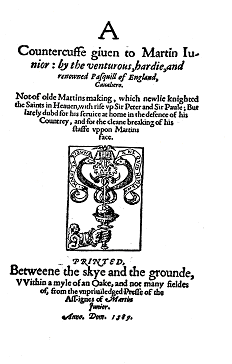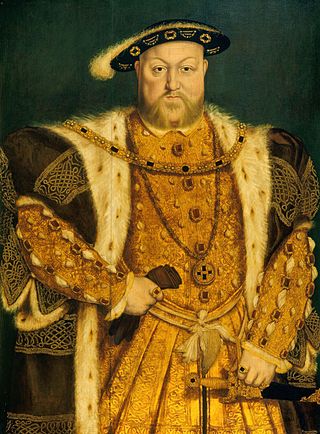
Huldrych or Ulrich Zwingli was a leader of the Reformation in Switzerland, born during a time of emerging Swiss patriotism and increasing criticism of the Swiss mercenary system. He attended the University of Vienna and the University of Basel, a scholarly center of Renaissance humanism. He continued his studies while he served as a pastor in Glarus and later in Einsiedeln, where he was influenced by the writings of Erasmus.

The Puritans were English Protestants in the 16th and 17th centuries who sought to rid the Church of England of what they considered to be Roman Catholic practices, maintaining that the Church of England had not been fully reformed and should become more Protestant. Puritanism played a significant role in English and early American history, especially during the Protectorate.

John Whitgift was the Archbishop of Canterbury from 1583 to his death. Noted for his hospitality, he was somewhat ostentatious in his habits, sometimes visiting Canterbury and other towns attended by a retinue of 800 horses. Whitgift's theological views were often controversial.

Edmund Grindal was Bishop of London, Archbishop of York, and Archbishop of Canterbury during the reign of Elizabeth I. Though born far from the centres of political and religious power, he had risen rapidly in the church during the reign of Edward VI, culminating in his nomination as Bishop of London. However, the death of the King prevented his taking up the post, and along with other Marian exiles, he was a supporter of Calvinist Puritanism. Grindal sought refuge in continental Europe during the reign of Mary I. Upon Elizabeth's accession, Grindal returned and resumed his rise in the church, culminating in his appointment to the highest office.

The Church of England traces its history back to 597. That year, a group of missionaries sent by the pope and led by Augustine of Canterbury began the Christianisation of the Anglo-Saxons. Augustine became the first archbishop of Canterbury. Throughout the Middle Ages, the English Church was a part of the Catholic Church led by the pope in Rome. Over the years, the church won many legal privileges and amassed vast wealth and property. This was often a point of contention between Kings of England and the church.

The Elizabethan Religious Settlement is the name given to the religious and political arrangements made for England during the reign of Elizabeth I (1558–1603). The settlement, implemented from 1559 to 1563, marked the end of the English Reformation. It permanently shaped the Church of England's doctrine and liturgy, laying the foundation for the unique identity of Anglicanism.

The Marprelate Controversy was a war of pamphlets waged in England and Wales in 1588 and 1589, between a puritan writer who employed the pseudonym Martin Marprelate, and defenders of the Church of England which remained an established church.
John Field (1545–1588), also called John Fielde or Feilde, was a British Puritan clergyman and controversialist.

The vestments controversy or vestarian controversy arose in the English Reformation, ostensibly concerning vestments or clerical dress. Initiated by John Hooper's rejection of clerical vestments in the Church of England under Edward VI as described by the 1549 Book of Common Prayer and 1550 ordinal, it was later revived under Elizabeth I. It revealed concerns within the Church of England over ecclesiastical identity, doctrine and church practices.

The Marian exiles were English Protestants who fled to continental Europe during the 1553–1558 reign of the Catholic monarchs Queen Mary I and King Philip. They settled chiefly in Protestant countries such as the Netherlands, Switzerland and Germany, and also in France, Italy and Poland.
Thomas Sampson was an English Puritan theologian. A Marian exile, he was one of the Geneva Bible translators. On his return to England, he had trouble with conformity to the Anglican practices. With Laurence Humphrey, he played a leading part in the vestments controversy, a division along religious party lines in the early years of the reign of Elizabeth I of England.

The English Reformation took place in 16th-century England when the Church of England was forced by its monarchs and elites to break away from the authority of the pope and the Catholic Church. These events were part of the wider European Reformation, a religious and political movement that affected the practice of Christianity in Western and Central Europe.

William Downham, otherwise known as William Downman, was Bishop of Chester early in the reign of Elizabeth I, having previously served as her domestic chaplain.
Patrick "Pat" Collinson, was an English historian, known as a writer on the Elizabethan era, particularly Elizabethan Puritanism. He was emeritus Regius Professor of Modern History, University of Cambridge, having occupied the chair from 1988 to 1996. He once described himself as "an early modernist with a prime interest in the history of England in the sixteenth and seventeenth centuries."

The reign of Elizabeth I of England, from 1558 to 1603, saw the start of the Puritan movement in England, its clash with the authorities of the Church of England, and its temporarily effective suppression as a political movement in the 1590s by judicial means. This led to the further alienation of Anglicans and Puritans from one another in the 17th century during the reigns of King James and King Charles I, that eventually brought about the English Civil War, the brief rule of the Puritan Lord Protector of England Oliver Cromwell, the English Commonwealth, and as a result the political, religious, and civil liberty that is celebrated today in all English speaking countries.
The Westminster Conference of 1559 was a religious disputation held early in the reign of Elizabeth I of England. Although the proceedings themselves were perfunctory, the outcome shaped the Elizabethan religious settlement and resulted in the authorisation of the 1559 Book of Common Prayer.

Historians have produced and worked with a number of definitions of Puritanism, in an unresolved debate on the nature of the Puritan movement of the 16th and 17th century. There are some historians who are prepared to reject the term for historical use. John Spurr argues that changes in the terms of membership of the Church of England, in 1604–6, 1626, 1662, and also 1689, led to re-definitions of the word "Puritan". Basil Hall, citing Richard Baxter considers that "Puritan" dropped out of contemporary usage in 1642, with the outbreak of the First English Civil War, being replaced by more accurate religious terminology. Current literature on Puritanism supports two general points: Puritans were identifiable in terms of their general culture, by contemporaries, which changed over time; and they were not identified by theological views alone.

The Convocation of 1563 was a significant gathering of English and Welsh clerics that consolidated the Elizabethan religious settlement, and brought the Thirty-Nine Articles close to their final form. It was, more accurately, the Convocation of 1562/3 of the province of Canterbury, beginning in January 1562.
The Reformation in Zürich was promoted initially by Huldrych Zwingli, who gained the support of the magistrates of the city of Zürich and the princess abbess Katharina von Zimmern of the Fraumünster Abbey, and the population of the city of Zürich and agriculture-oriented population of the present Canton of Zürich in the early 1520s. It led to significant changes in civil life and state matters in Zürich and spread to several other cantons of the Old Swiss Confederacy, and thus initiated the Reformation in Switzerland.

The Troubles at Frankfurt was a name given retrospectively to internal quarrels of the Marian exiles in Frankfurt am Main in the mid-1550s, involving also the Scottish reformer John Knox. Politically, Frankfurt was a Free Imperial City of the Holy Roman Empire.